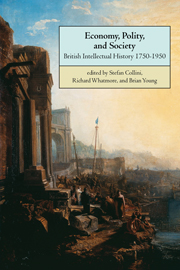Book contents
- Frontmatter
- Contents
- Preface
- General introduction
- Presentation of Economy, Polity, and Society
- Part I
- Part II
- 5 Economy and polity in Bentham's science of legislation
- 6 ‘A gigantic manliness’: Paine's republicanism in the 1790s
- 7 Irish culture and Scottish enlightenment: Maria Edgeworth's histories of the future
- 8 Improving Ireland: Richard Whately, theology, and political economy
- Part III
- List of contributors
- Acknowledgements
- Index
5 - Economy and polity in Bentham's science of legislation
Published online by Cambridge University Press: 18 December 2009
- Frontmatter
- Contents
- Preface
- General introduction
- Presentation of Economy, Polity, and Society
- Part I
- Part II
- 5 Economy and polity in Bentham's science of legislation
- 6 ‘A gigantic manliness’: Paine's republicanism in the 1790s
- 7 Irish culture and Scottish enlightenment: Maria Edgeworth's histories of the future
- 8 Improving Ireland: Richard Whately, theology, and political economy
- Part III
- List of contributors
- Acknowledgements
- Index
Summary
Recent study of British political thought in the decades between the American War of Independence and the Great Reform Act has produced a crowded picture dense with political traditions and doctrinal configurations. If earlier historical scholarship tended to focus on a limited number of famous contests (Burke against the Rights of Man; Whigs vs. Radicals over constitutional reform), we are now as likely to scrutinise High Church ecclesiology and Christian political economy; philosophic history and natural jurisprudence; Paleyite theological utilitarianism and evangelical social thought; shifting configurations of Dissent and Protest, and of Dissent and Patriotism; and finely shaded and carefully delineated varieties of Whiggism and Toryism.
In a manner perhaps surprising, this scholarship has left relatively untouched the figure of Jeremy Bentham, whose writings on law and politics had for earlier generations seemed an obvious and critical landmark for this period of British intellectual history. Often this (relative) neglect of Bentham is the intended aim of revisionist interpretation: the product of the well-rehearsed rejection of Leslie Stephen's image of utilitarianism as the natural heir of English Thought in the Eighteenth Century or of A. V. Dicey's depiction of Benthamism as the definitive blueprint for Victorian legislative reform. But some of this neglect may be considered the less intended by-product of the state of current Bentham scholarship. The great labour of the past generation – as centred on the publication of the new edition of Bentham's Collected Works – has been to produce a more accurate version of Bentham's thought itself, freed from the corruptions of Bentham's nineteenth-century editors, popularisers, and critics.
- Type
- Chapter
- Information
- Economy, Polity, and SocietyBritish Intellectual History 1750–1950, pp. 107 - 134Publisher: Cambridge University PressPrint publication year: 2000
- 10
- Cited by



